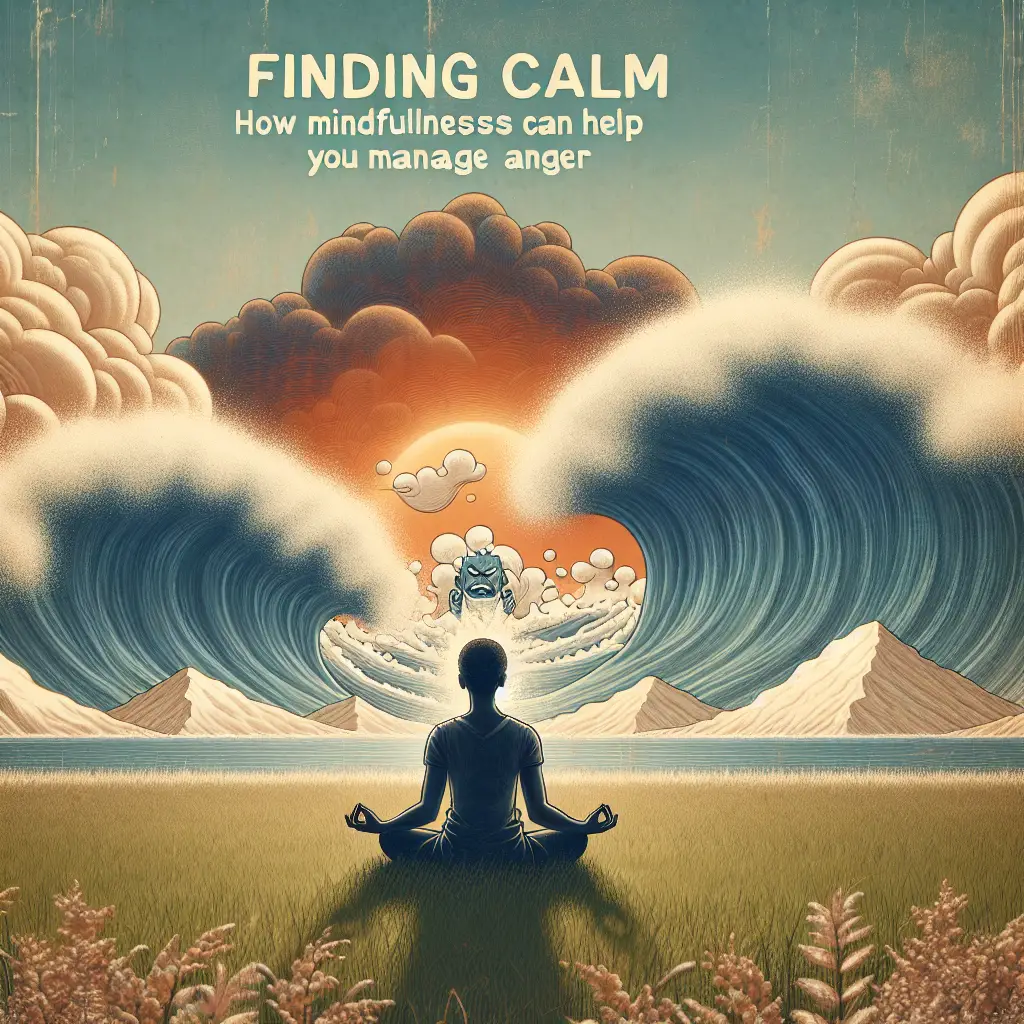
Finding Calm: How Mindfulness Can Help You Manage Anger
Introduction: The Need for Calm in an Angry World
In a world that often feels like it’s spinning out of control, finding a sense of calm can seem like a distant dream. Anger is a natural human emotion, but when it becomes overwhelming, it can wreak havoc on our relationships, health, and overall well-being. The journey to Finding Calm: How Mindfulness Can Help You Manage Anger is not just about suppressing this powerful emotion; it’s about understanding it, embracing it, and learning to navigate it without losing control.
Imagine having a toolbox filled with practical strategies that can help you effectively channel your anger, transforming it from a destructive force into a catalyst for positive change. This article explores how mindfulness can serve as that transformative tool, offering insights and techniques to manage your anger, promote emotional well-being, and ultimately, find calm.
Understanding Anger: A Double-Edged Sword
Anger is often misunderstood. It’s seen as an emotion to be suppressed or avoided. Yet, it serves a fundamental purpose: acting as a signal that something is wrong. Whether it’s an injustice we witness, a boundary being crossed, or discomfort from unmet needs, anger alerts us to issues deserving of our attention.
However, when unchecked, anger can escalate into rage or resentment, leading to harmful consequences. By understanding the triggers and manifestations of anger, we lay the groundwork for effective management strategies.
Case Study: The Power of Awareness
Consider the case of Amanda, a 35-year-old marketing executive. Overwhelmed by deadlines and office politics, Amanda often experienced outbursts of anger. With the guidance of a therapist, she began to practice mindfulness. Through this practice, Amanda learned to recognize her anger as a response to stress. By identifying her triggers—disrespectful comments from colleagues or unrealistic expectations—she developed a proactive approach to manage her emotions. This awareness allowed her to respond calmly rather than react impulsively, ultimately improving her workplace relationships.
What is Mindfulness?
At its core, mindfulness is the practice of being present in the moment, aware of your thoughts and emotions without judgment. It is about observing your feelings, including anger, with a gentle and accepting attitude. This non-judgmental awareness can create a space where anger can be experienced without overwhelming you.
The Science Behind Mindfulness and Anger Management
Numerous studies support the effectiveness of mindfulness in managing anger. A 2015 study published in the journal Emotion found that mindfulness meditation significantly reduced aggression and reactivity to anger-inducing situations. The research suggests that mindful individuals are less likely to respond to anger with aggression, instead choosing to step back, assess, and respond thoughtfully.
Techniques for Practicing Mindfulness
Breathing Exercises: Focused breathing can help center your thoughts and reduce the intensity of anger. Try inhaling deeply for a count of four, holding for four, and exhaling for a count of six.
Body Scan Meditation: This technique involves consciously relaxing each part of your body, helping to relieve the physical tension that often accompanies anger.
- Journaling: Writing about your feelings can help clarify your thoughts and emotions. Use prompts like “What made me angry today?” and “How did I respond?” to reflect on your emotional landscape.
Recognizing Your Anger Triggers
Understanding the triggers that ignite your anger is crucial in the journey toward Finding Calm: How Mindfulness Can Help You Manage Anger. Whether it’s a specific person, situation, or feeling of inadequacy, recognizing these triggers allows you to prepare and respond consciously, rather than react impulsively.
Creating a Trigger Journal
A practical approach involves keeping a journal specifically for anger triggers. Document the situations where you felt anger, noting the context, your emotional response, and the aftermath. Over time, patterns may emerge, offering insights into how to anticipate and manage your anger.
The Role of Self-Compassion
Practicing self-compassion is vital when dealing with anger. It allows you to be gentle with yourself when you slip up or feel overwhelmed. Self-compassion helps to reduce feelings of guilt and shame about your anger, making it easier to process and manage.
Mindfulness Techniques for Managing Anger: A Practical Guide
1. Pause and Reflect
When you feel anger rising, pause for a moment. Reflect on the situation. Ask yourself:
- What am I really feeling?
- Is this response proportional to the situation?
- How can I express my feelings constructively?
2. Mindful Observation
Engage in mindful observation by taking a step back and viewing the situation from different angles. This practice can help defuse the immediate emotional reaction and allow for space to respond thoughtfully.
3. Grounding Techniques
Grounding techniques can be incredibly effective for managing anger in the moment. Practicing mindfulness through physical sensations can re-anchor you. Focus on the feeling of your feet on the ground, the texture of an object, or the rhythm of your breathing.
Case Study: The Transformative Power of Mindful Observation
Jacob, a father of two, often felt overwhelmed during family conflicts. He quickly became irritable and reactive, leading to heightened tensions. After starting a mindfulness practice, Jacob began employing mindful observation. When conflicts arose, he learned to step back and assess the situation before reacting. This shift not only helped him articulate his feelings better but also transformed family interactions, fostering a more harmonious environment.
Cultivating a Mindfulness Practice: Daily Strategies
Integrating mindfulness into your daily routine is essential for long-term anger management. Here are practical strategies to establish a robust mindfulness practice:
Daily Meditation: Even five minutes of mindfulness meditation can start your day positively. Focus on your breath or listen to a guided meditation.
Mindful Walking: Incorporate mindfulness into your daily walks. Pay attention to each step, the feeling of your feet touching the ground, and the sounds around you.
- Mindfulness Reminders: Use post-it notes or phone alerts as reminders to take mindful breaks throughout your day. These reminders can help you pause and reset in moments of stress.
Table: Daily Mindfulness Practices for Anger Management
| Day | Practice | Duration |
|---|---|---|
| Monday | Breath Awareness Meditation | 5 mins |
| Tuesday | Journaling on Triggers | 10 mins |
| Wednesday | Mindful Walking | 15 mins |
| Thursday | Body Scan Meditation | 10 mins |
| Friday | Gratitude Practice | 5 mins |
| Saturday | Mindful Observation in Nature | 20 mins |
| Sunday | Reflective Journaling | 15 mins |
Overcoming Obstacles to Mindfulness
While mindfulness can profoundly impact your ability to manage anger, obstacles such as skepticism, impatience, and distractions may arise. Here are strategies to overcome these hurdles:
- Skepticism: Address doubts by educating yourself. Read books or attend workshops on mindfulness and anger management.
- Impatience: Understand that mindfulness is a skill that requires practice. Celebrate small successes along the way.
- Distractions: Create a dedicated space for practice. Keeping technology away during mindfulness sessions can enhance focus.
The Long-Term Benefits of Mindfulness
The long-term benefits of cultivating mindfulness in your life extend beyond anger management. Regular practice leads to improved emotional regulation, decreased levels of anxiety and depression, and increased resilience.
Final Thoughts on the Journey
Finding calm through mindfulness is a continuous journey that requires commitment, practice, and compassion toward oneself. As you begin to implement these techniques, you will find that managing anger becomes easier, allowing for more enriching relationships and a deeper sense of peace.
Conclusion: Embrace the Calm Within You
In closing, the pathway to Finding Calm: How Mindfulness Can Help You Manage Anger is accessible to everyone. By understanding anger as a natural emotion and employing mindfulness techniques, you can transform how you relate to this powerful feeling. Rather than being a source of stress and strife, anger can become an opportunity for growth and deeper self-awareness.
As you engage in this practice, remember that perfection is not the goal—progress is. Each moment spent in mindfulness brings you closer to mastering your emotional landscape, allowing you to respond with clarity and compassion.
FAQs
1. Can mindfulness really help me manage my anger?
Yes, mindfulness helps you develop greater emotional awareness and control, allowing you to respond to anger more constructively.
2. How long should I practice mindfulness each day?
Even a few minutes daily can make a difference. Start with five minutes and gradually increase as you feel comfortable.
3. What if I struggle to focus during meditation?
It’s normal to struggle with focus. Gently bring your attention back to your breath or chosen focus point whenever your mind wanders.
4. Can mindfulness be practiced while interacting with others?
Absolutely! You can practice mindfulness during conversations by actively listening and focusing on the present moment.
5. Is it too late to start practicing mindfulness?
It’s never too late to start. Mindfulness can be introduced at any stage of life and can yield immediate and long-lasting benefits.
Through patience and persistence, you can cultivate a calmer, more mindful approach toward anger. Embrace the journey of Finding Calm: How Mindfulness Can Help You Manage Anger—the best changes start from within.

















